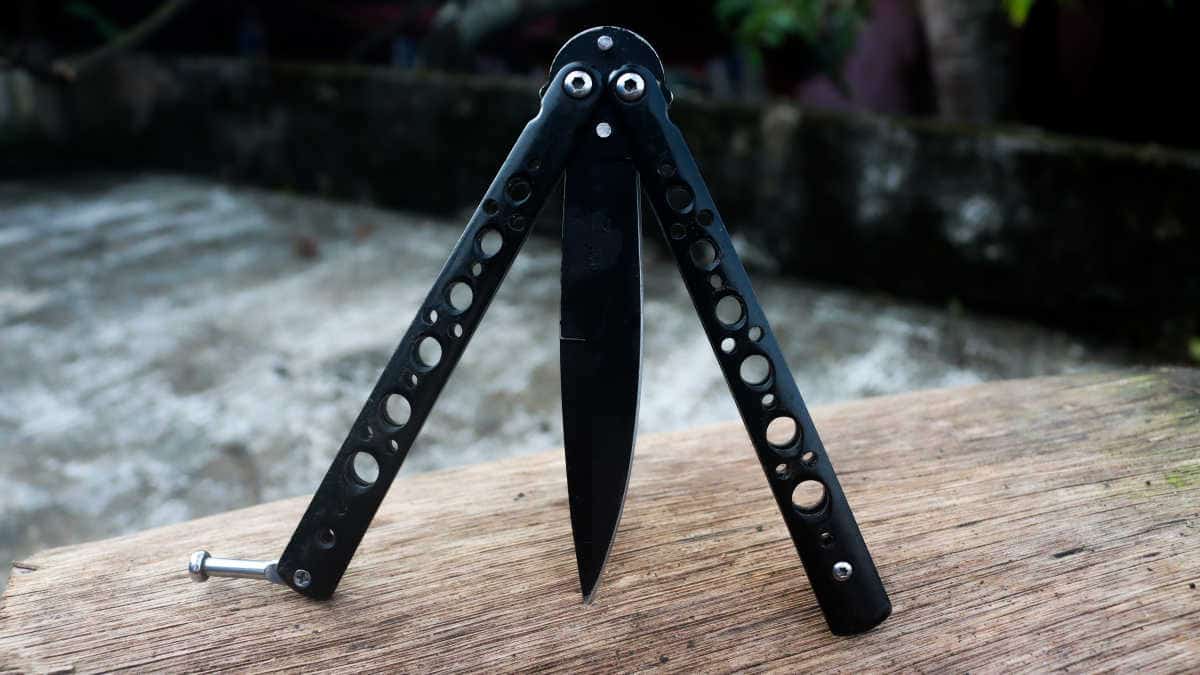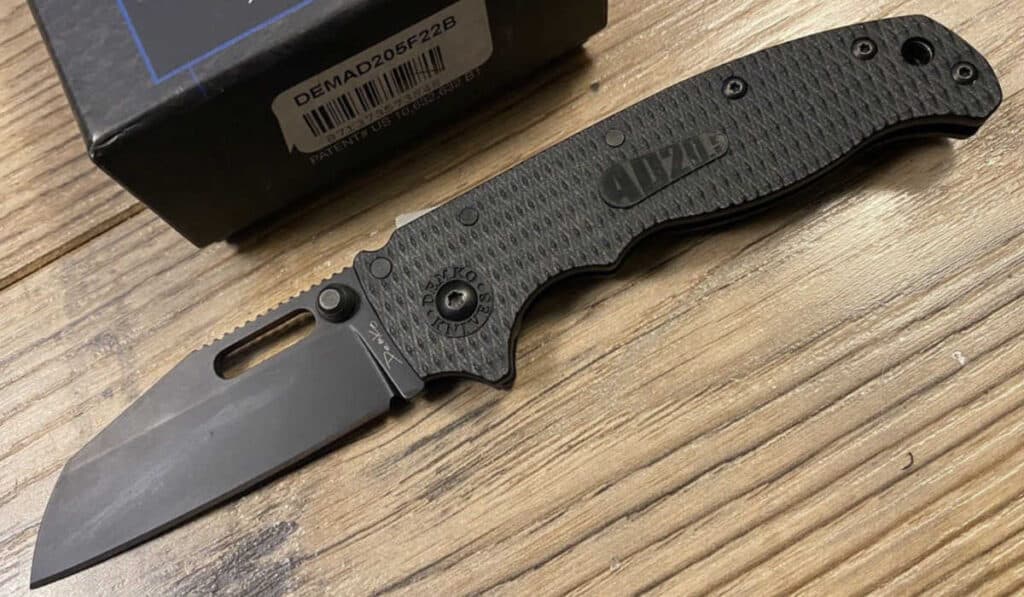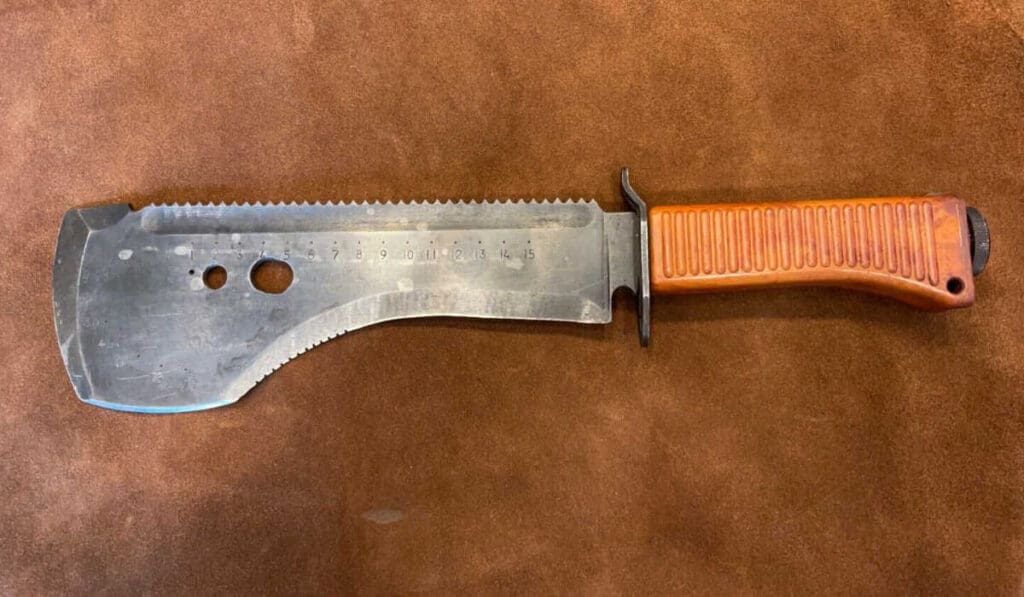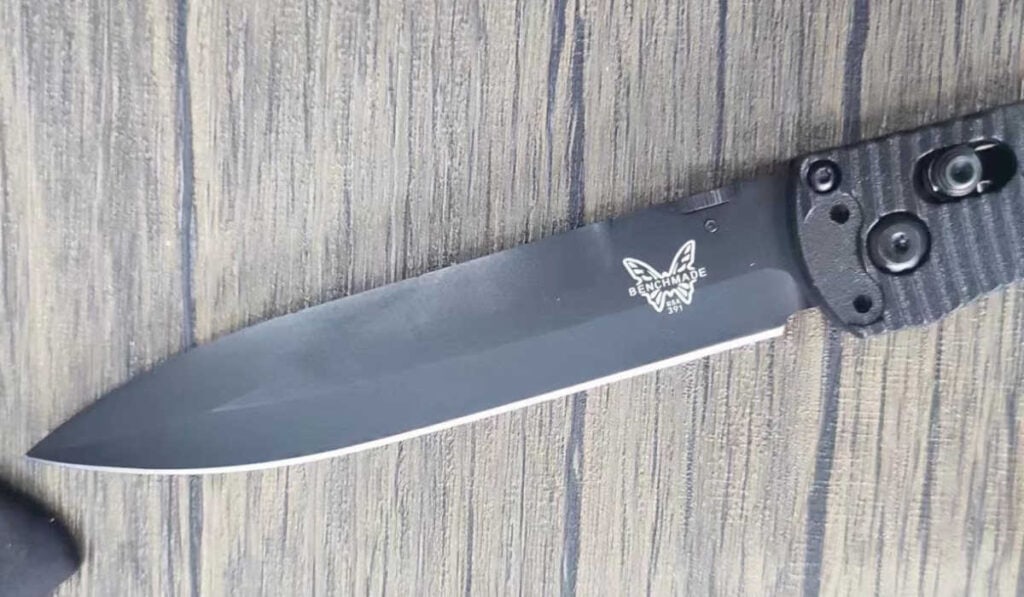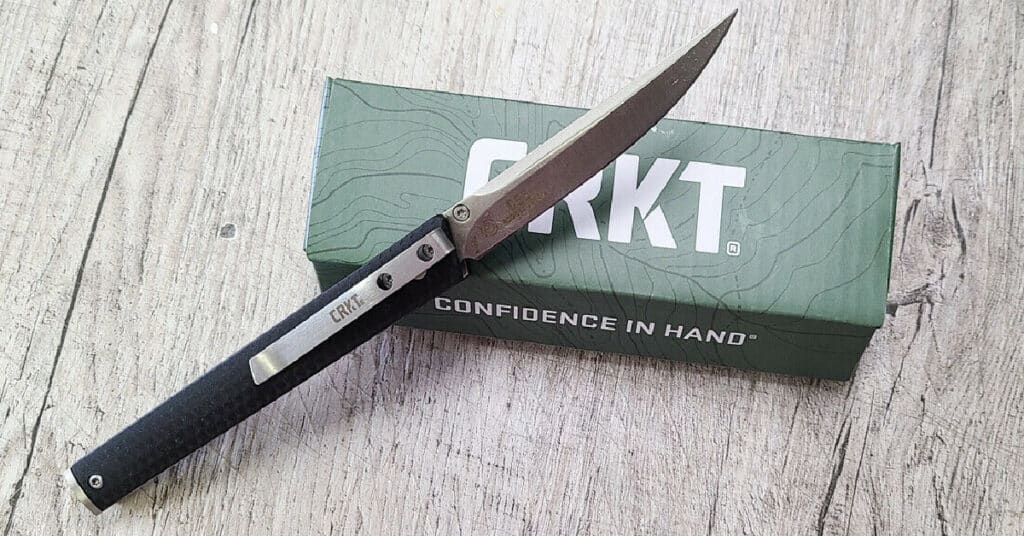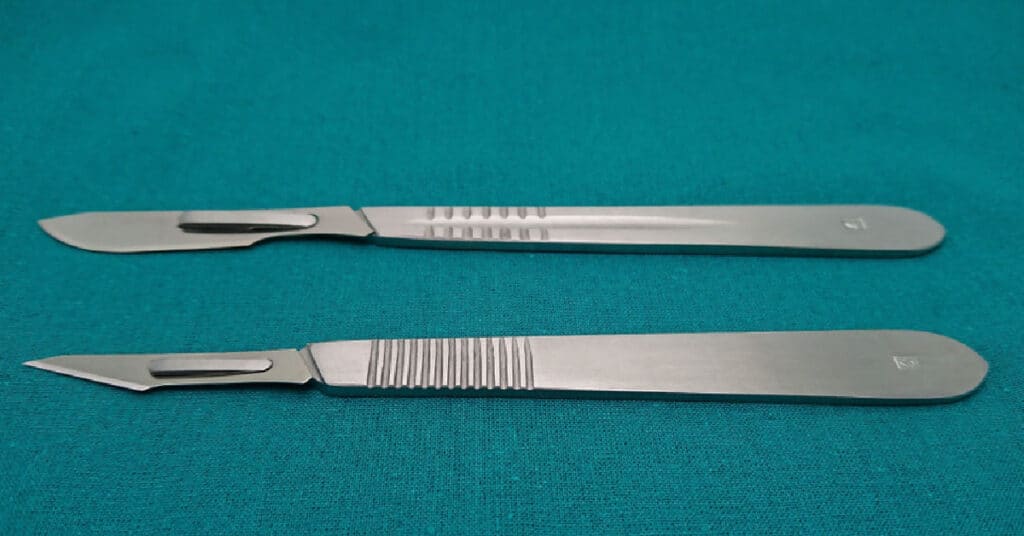As an Amazon Associate I earn from qualifying purchases.
Butterfly knives, also known as balisongs, have been a subject of fascination and controversy for many years. These unique folding knives feature two handles that rotate around a central blade, allowing for intricate flipping tricks and swift opening and closing. While they are admired by many for their beauty and skillful manipulation, concerns about their potential danger have led to some states implementing regulations and restrictions on their use and possession.
In the United States, the legality of butterfly knives varies from state to state. Some states classify them as switchblades and consider them illegal, while others have specific laws or regulations regarding their possession and use. For example, in California, butterfly knives are illegal under Penal Code 21510 PC. This law classifies them as a form of a switchblade, making it a crime to carry, possess in public, sell, or otherwise transfer a butterfly knife. It is crucial for knife enthusiasts and collectors to familiarize themselves with the specific regulations in their state or jurisdiction in order to avoid unintentional legal consequences.
What Are Butterfly Knives
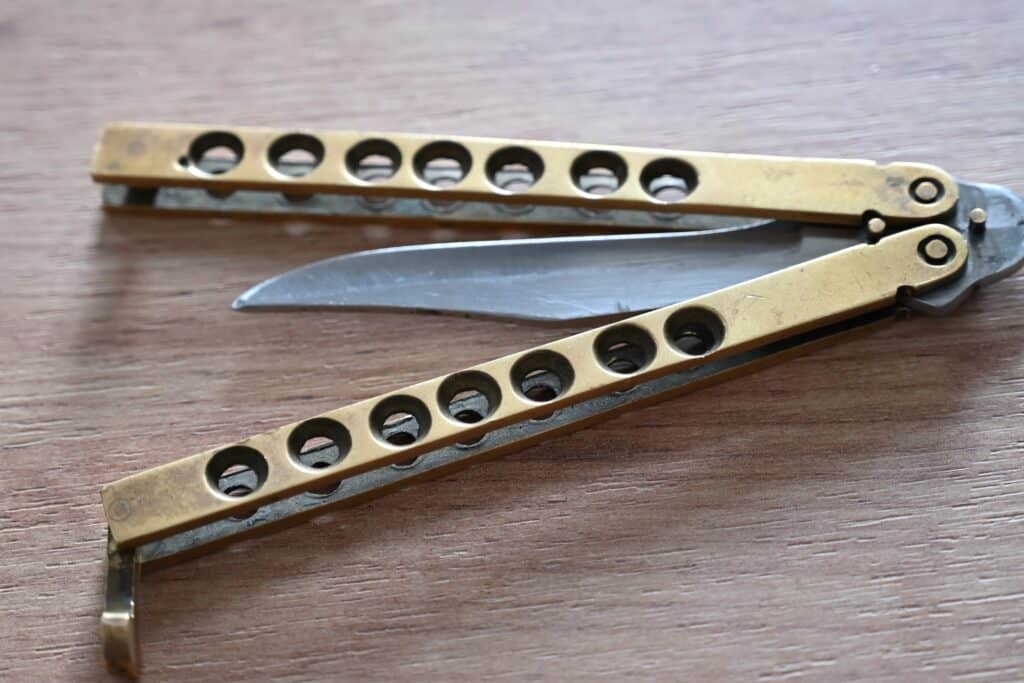
Butterfly knives, also known as balisongs, are a type of folding pocketknife that have a distinctive, often eye-catching, opening mechanism. They consist of two handles that pivot around a single blade, allowing the knife to be flipped open and closed with one hand. Originally from the Philippines, these knives have a rich history and were once used for self-defense and as pocket utility tools.
The blade of a butterfly knife is typically made from high-quality stainless steel or other durable materials, ensuring it remains sharp and resistant to corrosion. The handles, on the other hand, can be made from a variety of materials such as metal, wood, or even plastics. These handles are designed to provide a secure grip while performing the intricate flipping techniques associated with butterfly knives.
Balisongs have gained a reputation within the knife community for their mesmerizing tricks and performances that skilled users can execute. The flipping motion not only looks impressive but can also be used as a form of self-defense in specific situations. However, it is important to practice and handle butterfly knives responsibly, as inexperienced users may accidentally injure themselves during improper use.
When it comes to the legality of butterfly knives, their classification and restrictions vary from state to state within the United States. In certain areas, they may be considered switchblades, daggers, or gravity knives, which can result in them being illegal to possess. It is paramount to familiarize yourself with the local laws and regulations surrounding butterfly knives before attempting to purchase or carry one.
Legal Status in the United States
The legality of butterfly knives, also known as balisongs, varies across different states in the United States. While some states consider them legal, others have laws banning or restricting their possession, sale, and use. In this section, we will discuss the legal status of butterfly knives in the United States and outline the states where they are legal or illegal.
Are Butterfly Knives Legal In Your State?
(Do note that laws change so be sure to double-check as I can only update things so fast)
Alabama: Yes. No restrictions on the possession of butterfly knives.
Alaska: Yes. No restrictions on butterfly knives.
Arizona: Yes. Arizona has no restrictions on owning or carrying butterfly knives.
Arkansas: Yes. No specific restrictions on butterfly knives.
California: No. Butterfly knives are illegal in California.
Colorado: Yes, with restrictions. Butterfly knives with blades over 3.5 inches are illegal.
Connecticut: Yes, with restrictions. It’s legal to own butterfly knives, but carrying them is illegal.
Delaware: No. Butterfly knives are illegal.
Florida: Yes. Florida has no restrictions on butterfly knives.
Georgia: Yes. No restrictions on butterfly knives.
Hawaii: No. Butterfly knives are illegal in Hawaii.
Idaho: Yes. Idaho has no restrictions on butterfly knives.
Illinois: Yes. Illinois has no restrictions on butterfly knives.
Indiana: Yes. No restrictions on butterfly knives.
Iowa: Yes. Iowa has no restrictions on butterfly knives.
Kansas: Yes. No restrictions on butterfly knives.
Kentucky: Yes. No restrictions on butterfly knives.
Louisiana: Yes. Louisiana has no restrictions on butterfly knives.
Maine: Yes. No restrictions on butterfly knives.
Maryland: Yes. No restrictions on butterfly knives.
Massachusetts: No. Butterfly knives are illegal in Massachusetts.
Michigan: Yes. Michigan has no restrictions on butterfly knives.
Minnesota: Yes. No restrictions on butterfly knives.
Mississippi: Yes. No restrictions on butterfly knives.
Missouri: Yes. Missouri has no restrictions on butterfly knives.
Montana: Yes. Montana has no restrictions on butterfly knives.
Nebraska: Yes. No restrictions on butterfly knives.
Nevada: Yes. No restrictions on butterfly knives.
New Hampshire: Yes. New Hampshire has no restrictions on butterfly knives.
New Jersey: No. Butterfly knives are illegal in New Jersey.
New Mexico: Yes. No restrictions on butterfly knives.
New York: No. Butterfly knives are illegal in New York.
North Carolina: Yes. No restrictions on butterfly knives.
North Dakota: Yes. No restrictions on butterfly knives.
Ohio: Yes. No restrictions on butterfly knives.
Oklahoma: Yes. No restrictions on butterfly knives.
Oregon: Yes. No restrictions on butterfly knives.
Pennsylvania: No. Butterfly knives are illegal in Pennsylvania.
Rhode Island: Yes, with restrictions. Carrying a concealed butterfly knife is illegal.
South Carolina: Yes. No restrictions on butterfly knives.
South Dakota: Yes. No restrictions on butterfly knives.
Tennessee: Yes. No restrictions on butterfly knives.
Texas: Yes. No restrictions on butterfly knives.
Utah: Yes. No restrictions on butterfly knives.
Vermont: Yes, with restrictions. It is illegal to carry a butterfly knife concealed.
Virginia: Yes. No restrictions on butterfly knives.
Washington: No. Butterfly knives are illegal in Washington.
West Virginia: Yes. No restrictions on butterfly knives.
Wisconsin: Yes. No restrictions on butterfly knives.
Wyoming: Yes. No restrictions on butterfly knives.
➡️ Visit Our State Knife Law Directory
Balisongs and Switchblades
Butterfly knives, also known as balisongs, have a unique folding mechanism, which involves two handles counter-rotating around the blade’s tang. The blade is concealed within grooves in the handles when the knife is closed. Due to its unique design and potential danger, butterfly knives are frequently compared to switchblades. Switchblades, on the other hand, are automatic knives that deploy the blade by activating a button, lever, or other mechanisms.
In terms of legality, it’s essential to note that public opinion and certain state laws sometimes inaccurately assume that balisongs and switchblades are entirely illegal. In fact, these knives are only illegal under specific circumstances and in specific jurisdictions.
Federal law, specifically the Federal Switchblade Act, considers butterfly knives to be switchblades. As per the act, both types of knives cannot be possessed on certain federal property or territories. However, this does not mean that butterfly knives are entirely illegal under federal law. The reality is that butterfly knives, much like switchblades, are legal in several states and territories but restricted in others.
The confusion surrounding the legality of these knives can be attributed to their classification as gravity knives, daggers, switchblades, or other dangerous knife types under state laws. In the United States, butterfly knives are illegal in eight states with varying degrees of restriction. A few factors that impact their legality include the length of the blade, purpose of use, and the type of locking mechanism. It’s essential to review local regulations when considering owning and carrying a butterfly knife or switchblade.
In conclusion, while butterfly knives and switchblades share similarities, each type of knife carries its unique set of restrictions and legalities. Knowledge of federal and state regulations is vital to ensure lawful possession and use of these fascinating tools.
Factors Determining Legality
When it comes to butterfly knives, several factors determine their legality. Understanding these factors can help ensure safe and responsible ownership while avoiding potential legal issues.
The first factor to consider is the method of carry. Butterfly knives, also known as balisongs or fan knives, are considered folding pocket knives. Some jurisdictions differentiate between concealed and open carry of such knives and may impose restrictions on one method while allowing the other. In some states, such as Utah and Oregon, butterfly knives are forbidden in the state of concealment, but open carry may be allowed. So, it’s essential to know your jurisdiction’s specific regulations on carrying butterfly knives.
Another important factor is the blade length. Some states, such as California in its Penal Code 21510, mention that switchblade knives with a blade of two or more inches are considered illegal. Similarly, a butterfly knife with a blade exceeding a specific length might be restricted in some jurisdictions.
Possession restrictions also play a role in determining the legality of butterfly knives. In certain states like Texas, butterfly knives are viewed as switchblades, making them illegal to possess. In other states like Wisconsin, possessing butterfly knives may be legal only on your own property. Age restrictions can also apply, with some jurisdictions prohibiting minors from owning butterfly knives.
Lastly, how a butterfly knife is defined by law can determine its legality. In some places, butterfly knives are simply referred to as pocket knives, while in others, they might be classified as dangerous or deadly weapons. If a butterfly knife is deemed a dangerous or deadly weapon, ownership may require a special permit or be completely restricted in some states.
It is crucial to research and understand the specific laws and regulations concerning butterfly knives in your jurisdiction to ensure safe and legal use.
Ownership and Carrying Restrictions
Butterfly knives, also known as balisongs, have various ownership and carrying restrictions in different parts of the United States. It’s essential to be knowledgeable about these regulations to avoid legal issues. To understand the restrictions around butterfly knives, it’s crucial to differentiate between possession and carrying laws. Possession refers to owning the knife, while carrying refers to having the knife on your person in a public place.
In some states, butterfly knives are considered dangerous weapons and are subject to specific regulations. For example, in New York, residents can own butterfly knives, but visitors cannot carry them. Similarly, Hawaii has a no-tolerance policy for these knives, and California restricts possession of knives longer than two inches, which rules out most butterfly knives.
Federal laws do not explicitly ban butterfly knives; however, individual states can have their own regulations related to these knives. In 42 states, there are no strict laws against butterfly knife possession. Still, some states have concealment laws that affect carrying these knives in public places or certain premises.
Besides butterfly knives, other types of knives can be prohibited or restricted, such as daggers. Ownership laws primarily aim to regulate knives associated with crime or deemed “dangerous” by society.
In conclusion, although butterfly knives are not universally illegal, it is essential to understand the specific ownership and carrying restrictions in your state to avoid potential legal issues.
Federal Knife Laws
The primary law governing knives at the federal level in the United States is the Switchblade Knife Act of 1958 15 U.S.C. 1244. This law outlines the restrictions on the manufacturing, transportation, and distribution of switchblades across state lines or internationally.
In accordance with the Switchblade Knife Act, a switchblade is defined as a knife where the blade is ejected from the handle by a push of a button, switch, or the application of mechanical pressure. This definition also covers gravity knives, which open using the force of gravity or inertia, such as butterfly knives. It is important to note that butterfly knives can be categorized as switchblades in some states, making them illegal.
Individuals who are traveling between states or internationally should be aware of the federal knife law, and be informed about the specific knife laws in each state. For instance, some states have their own set of guidelines for carrying or owning various types of knives, which may differ from federal regulations.
Federal knife laws are also relevant when it comes to federal property. Knives are generally not allowed on federal property such as courthouses, military installations, and other government buildings. This encompasses any types of knives, regardless of their classification as switchblades, butterfly knives, or other types.
In conclusion, it is essential for knife owners and users to be familiar with the Switchblade Knife Act of 1958, be cognizant of state-specific knife laws, and abide by any restrictions when traveling or entering federal property.
Conclusion
Butterfly knives, also known as balisongs or fan knives, are a type of folding pocket knife with two handles that rotate around the blade. These knives have been popularized through movies and media as dangerous weapons used by martial artists and gang members. However, their legality remains ambiguous in many jurisdictions.
In some places, butterfly knives are illegal due to their potential for use as a threatening weapon. With extensive practice, a person can deploy these knives with great speed, which might be their most dangerous quality. The laws surrounding butterfly knives vary depending on where you live, so it is essential to research the regulations in your area before purchasing or carrying one.
Even if it is legal to own a butterfly knife, you may still face legal consequences if you carry it in public or use it inappropriately. It is crucial to exercise caution and ensure that you are complying with all local laws and regulations when using or carrying any type of weapon, including butterfly knives.
To stay on the safe side, consider investing in alternatives like training or practice butterfly knives, which do not have sharp blades but still allow enthusiasts to perform tricks and maneuvers. These alternatives can provide a legal and safer option for those interested in learning the art of using butterfly knives without the risk of breaking the law or causing harm.
Do Sheepsfoot Blades Have A Purpose? (Cuz They’re Ugly…)
Spetsnaz Machetes – Blades Of The Russian Special Forces
What Is The Actual Purpose Of A Spear Point Knife Blade?
CRKT CEO Review – Coolest, Most Worthless Knife Ever?
How Sharp Is A Scalpel? (Is It Sharper Than A Razor?)
Can You Shave With A Knife? (Yes, Here’s How)
As an Amazon Associate I earn from qualifying purchases.

